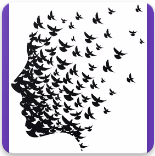Fear of criticism
Here you find background information, a fear test and an effective approach to treating the fear of criticism.

6 minutes reading time.
For people who are particularly afraid of criticism, it feels as if their own existence is threatened if they experience criticism. These people adapt their behavior so that they do not give rise to criticism. They find it difficult to deal with it; they cannot take criticism so easily.
Those who are overly afraid of criticism are dependent on the judgment of others and feel at the mercy of others. Their self-image can therefore be quickly shaken from the outside. In addition, those affected generally fear that others could form a negative image of them. This is because people who are afraid of criticism feel inadequate and judge their own behavior and characteristics as bad. Their own person is devalued.
People who are afraid of criticism are socially inhibited. They can sometimes appear shy and reserved because they don’t want to do anything wrong. Or they may radiate insecurity in other ways, for example by agreeing with the opinions of others or keeping their personal opinions to themselves. They don’t want to fall out of favor in order to avoid rejection.
In extreme cases, the fear of criticism can also be diagnosed as a self-confident personality disorder. This pathologically anxious-avoidant personality is characterized by feelings of inferiority and the worry that other people might think badly of them, which leads to additional tension.
Fear of criticism symptoms
People who are afraid of criticism are particularly quick to feel offended by critical words and react sensitively to them. For those affected, being criticized is tantamount to a rejection of themselves.
To prevent such a situation from arising in the first place, these people try to behave in such a way that nobody can find fault with them. They protect themselves from critical looks or words by avoiding any non-conformity and always conforming to the group in which they find themselves. Because they want to please everyone, they are particularly sweet and nice. They want to please others and are afraid to say no.
Those who are afraid of criticism tend not to express any criticism themselves. They hold back their feelings and prefer to keep their thoughts to themselves for fear of being ridiculed or shamed, even in intimate relationships. To avoid being judged for mistakes and weaknesses, they hide and conceal them. This creates a feeling of not really being known by anyone. Only when those affected are sure that they are liked do they gradually open up and show themselves as they are, without pretending.
They avoid at all costs creating opportunities in which they could be criticized or ridiculed. In doing so, they neglect their own desires and needs and conform to what others want, be it the boss, friends or relatives. They accept inappropriate behavior and even impertinence on the part of others in order to avoid their disapproval.
Those affected also offer little scope for negative reactions if they behave inconspicuously. Being average, saying yes, staying in the background and always keeping a low profile instead of taking risks is another way of avoiding criticism and rejection and avoiding it as much as possible. After all, being the center of attention always carries the risk of not pleasing someone. People who fear criticism refrain from standing out from the crowd or trying something new for fear of criticism and disapproval. Sometimes they also avoid making closer contacts, for example in a professional context, in order to avoid possible rejection.
They primarily concede the ability to judge what is right and wrong, good or bad, appropriate or inappropriate to others. People who are afraid of criticism trust their own judgment less and quickly become insecure. They quickly feel ashamed or guilty towards their critics and usually agree with the other party by adopting their point of view instead of explaining and defending their own position.
People who are wary of criticism find it difficult to stand up for themselves and assert themselves against others. They prefer to stay out of interpersonal situations and close contacts as far as possible before things can get dicey. Another strategy for dealing with fear of criticism is perfectionism. After all, if you do something flawlessly, behave impeccably or look perfectly styled, you can expect praise and recognition. However, this tendency can lead to excessive demands and carries a higher risk of burnout or obsessive-compulsive disorder.
As people who are afraid of criticism want to please others due to their insecurity and make their own value dependent on this, they feel rejected and pushed away as a person overall and relationships seem threatened. This fear prevents those affected from being free and paralyzes them. The low opinion of themselves leads those affected to reproach themselves for their conformist behavior. Not having the courage to stand up for their own opinion or go their own way can lead to those affected secretly despising themselves as hypocrites, suck-ups or followers.
People affected by fear of criticism can also suffer from somatic (physical) complaints if the subliminal fear of criticism is very high in a situation, for example because their own wishes run counter to the needs of others and external expectations would be disappointed as a result. For example, an acute headache or stomach ache may occur, giving the person an excuse or objectively justifying a decision, such as turning down an invitation.
Fear of criticism causes
The fact that mistakes or not pleasing others lead to their person being devalued is something they learned from their parents in childhood. If the upbringing was accompanied by a devaluing, emotionless and less empathetic attitude, the child internalized, due to its dependence on the parents, that it is only good and lovable if it meets external expectations. The fear of criticism and rejection can therefore be seen as an infantile (childish) fear, the origin of which is no longer conscious. However, the feeling of threat has been internalized, i.e. it has remained.
Fear of criticism therapy
Overcoming fear of criticism
Meanwhile, every specific fear, repressed or not, can be resolved. Even the fear of criticism. When you dissolve this fear, you will notice that the avoidance behaviors and the blockages caused by the defense mechanisms also fall away. The result is freedom from fear.
Fear of criticism test
You will find the fear test in the round, blue circle at the bottom right of the screen. If you click on it, it will open and you can start immediately. Free of charge, without advertising and without registration!
You start by entering “fear of criticism” in the fear test. It will then check whether you actually have this fear inside you. If you find what you are looking for, the fear of criticism can be resolved with our “Fear Therapy” app. You can find the link under the test. This app works without confrontation and without traveling into the past! You can therefore also do it on your own.
Get started as soon as possible. There is something very liberating and calming about resolving fears.
Whoever DOESN’T RESOLVE THE CAUSES IS ONLY WORKING ON SYMPTOMS!
“Thinking will not overcome fear, but acting will.”

Fear Therapy
Effective fear treatment in an app!
Effective content and techniques for treating fears/anxiety.
Thoroughly dissolve any fear, including the associated negative cognition/belief!
No direct confrontation (exposure) with the fear!
Also deals with individual cognitions and all other emotions such as shame, sadness, hate, anger, etc.
Buy the "Fear Therapy" app now for just 19.99 Euros!
Available in the Apple™ App Store or in the Google™ Playstore.


For all questions ...
... please do not hesitate to contact us. Whether it's a question of understanding, product details or questions about treatment.
We are happy to help!

“The highest happiness of man is liberation from fear.”
Walther Rathenau, (1867 - 1922), Politician, writer, industrialist 1922



